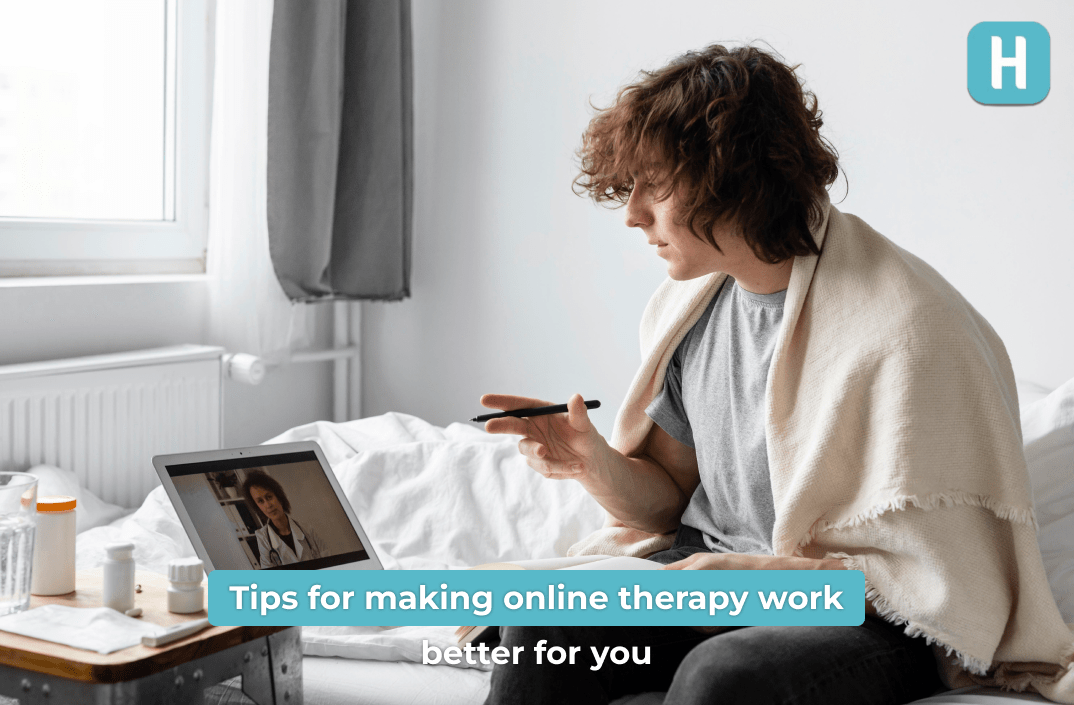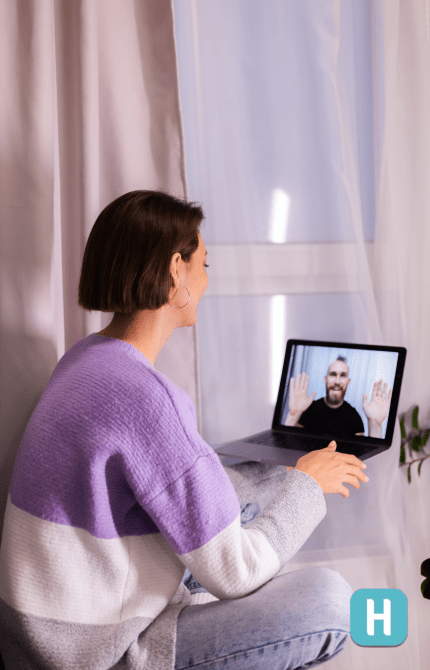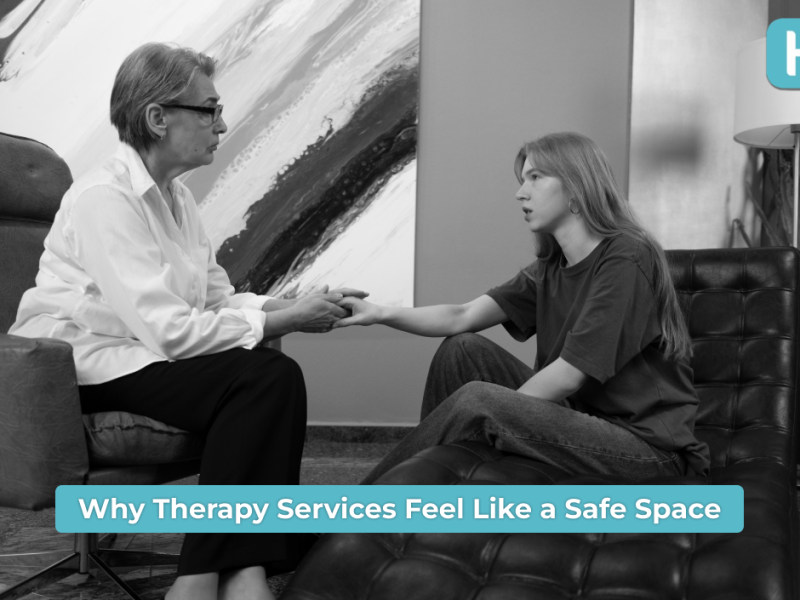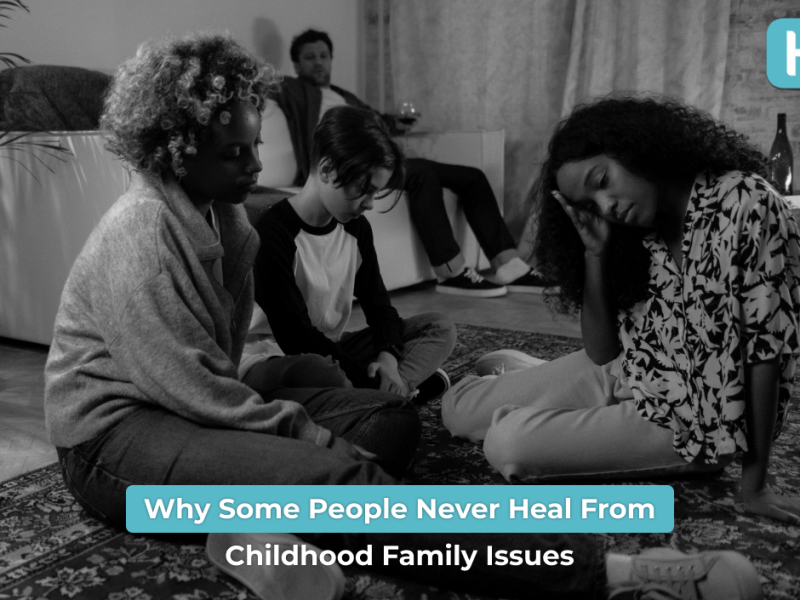Let’s get real.
Online therapy is a beautiful thing; it gives you access to support from anywhere, whether you’re sitting in your bedroom, hiding in your car, or living somewhere where in-person help isn’t even an option.
But if we’re being honest, it also comes with its own kind of awkward.
You log in. You see your therapist’s face on a screen. You try to open up, but maybe it feels weird, like you’re talking into the void. The screen freezes. You lose your train of thought. And you start wondering…
Is this actually helping? Or am I just talking to a laptop once a week?
If that’s ever crossed your mind, you’re not alone. The truth is: online therapy can absolutely change your life, but only if you know how to work with it.
Here are down-to-earth, honest, real-world tips to make online therapy work better for you.
1. Don’t Wing It, Set the Scene
You know how it feels different when you talk to someone in person? There’s a vibe, a connection, a sense of being in the moment.
Online, it’s easy to lose that, especially if you’re lying in bed with Netflix paused in the background.
To help online therapy work better, create a space that tells your brain: “This is my time.”
- Sit somewhere quiet where no one will walk in.
- Shut the door.
- Put your phone on silent.
- Light a candle or hold a pillow.
- Sit in a chair, not your bed; it helps more than you’d think.
This isn’t about being formal, it’s about feeling safe, focused, and present.
2. Use Headphones. Always.
This one feels minor, but it’s a game-changer.
Headphones help you block out the world. They make your therapist’s voice feel closer. More intimate. More real.
And when you’re talking about something that’s hard to say out loud? That extra bit of privacy, even if it’s just in your own room, can make a huge difference.
3. Don’t “Perform” Therapy
We get it. Sometimes you feel like you need to come into therapy with a list. Or say something that sounds insightful. Or show your therapist that you’re making progress.
But here’s the thing: you don’t need to be impressive. You just need to be honest.
Some weeks, you’ll cry. Other weeks, you’ll say, “I don’t even know what to talk about.”
That’s all part of the process.
The more honest you are, the more your therapist can meet you where you are. And that’s how you start getting the most out of online therapy.
4. Name What You Need
Your therapist isn’t a mind reader. And with a screen between you, it’s even harder for them to pick up on subtle cues.
So say the thing. Out loud.
- “I need help setting boundaries.”
- “Can we slow down? I’m feeling overwhelmed.”
- “I want more coping tools, not just talking.”
Naming what you want doesn’t make you demanding, it makes you brave.
In fact, learning to name your needs is one of the best tips for better online therapy sessions and for life in general.
5. Write Things Down After
Ever had a great session… and then forgot everything two hours later?
Yup. That’s real.
Therapy doesn’t end when the Zoom call ends. Some of the deepest processing happens after.
So when the call ends:
- Sit for a moment.
- Write one or two things that stood out.
- Jot down how you felt.
- If something felt “off,” write that too.
Over time, those notes become a record of your healing, something you can look back on and think:
“Wow, I really have grown.”
This is a simple trick that can help you maximize the benefits of online therapy without even realizing it.
6. Don’t Bail on Sessions When You’re “Fine”
It’s so tempting to cancel when you’re not falling apart.
But healing isn’t just about crisis management.
Some of your most powerful sessions will happen when you’re not in panic mode, when you’re calm enough to reflect, process, or go deeper.
So next time you think, “I don’t really need this session,” pause.
That might be exactly when you need it most and online therapy work better.
7. If It’s Not Working, Say So
Sometimes therapy feels off. That doesn’t mean you’re broken. And it doesn’t always mean your therapist is a bad fit.
But silence helps no one.
Say:
- “I feel stuck.”
- “I don’t think this approach is helping.”
- “Can we try something different?”
You deserve to be in a space that feels like it’s helping.
And naming what’s not working? That’s how you make online therapy work better in the long run.
8. Show Up As You Are
Pajamas. Tears. Blank stares. Angry rants.
You are allowed to bring all of that to your session.
This isn’t a job interview. It’s your healing space.
So if all you can do is log in and sit there in silence, that’s okay. That’s still showing up.
Sometimes the silence speaks louder than words ever could.
9. Set a Tiny Goal Between Sessions
You don’t need a 12-step self-care routine or a Pinterest mood board.
Try this instead:
Before your session ends, ask yourself:
- “What’s one thing I want to try this week?”
It could be:
- Saying “no” once.
- Journaling for 5 minutes.
- Take one deep breath before reacting.
- Small steps are where the big shifts begin.
10. Use the Benefits of Technology
Here’s a reframe: Online therapy isn’t second best. It’s a different kind of powerful.
- You can do it from home, on your own couch.
- You can take a nap right after, or go for a walk.
- You can use notes, screen-sharing, messages, eveand n chat tools during or after.
Sometimes healing happens more easily when you’re in your own space. Use that to your advantage.
This is one of the underrated online therapy tips for better results: use the tools at your fingertips. They’re part of the process too.
11. Let the Awkward Be Part of It
Online therapy can feel weird. Delays. Frozen screens. You both accidentally talk at the same time.
And you know what? That’s okay.
Therapy isn’t about being polished. It’s about being human.
So if something feels awkward, name it. Laugh about it. Let it pass.
Because the connection you build in therapy isn’t made of perfect sentences, it’s made of realness.
12. Give It Time
You won’t walk away from your first few sessions feeling “fixed.”
That’s not how healing works.
Sometimes, therapy feels like you’re digging through old boxes in your attic , messy, dusty, full of stuff you forgot.
But eventually… You start to make spacea and online therapy work better.
- You start to see patterns.
- You start to feel lighter.
Let the process take the time it needs. Trust that the work is happening, even when you can’t see it yet.
13. Let Go of the Idea That Healing Should Look a Certain Way
Let’s clear something up:
There’s no “right” way to do therapy. No perfect pace. No timeline you need to follow.
One of the biggest reasons people feel frustrated or give up on therapy is that they expect it to feel good all the time. Or they think they should have life-changing revelations every single week.
But here’s the truth: healing is weird.
- Some weeks, you’ll cry through your entire session.
- Other weeks, you’ll talk about grocery lists and your favorite movie.
- Sometimes, you’ll leave feeling hopeful.
- Other times, you’ll feel tired, heavy, or unsure.
None of that means you’re failing.
In fact, it often means you’re doing the work, and your nervous system is catching up.
So if you’re wondering how to make online therapy work better, start by letting go of unrealistic expectations. Show up. Be real. Let the process be messy.
14. Let Yourself Be Heard, Even If It Feels Pointless
Ever felt like you’re talking and your words aren’t landing?
Or like you’re rambling about things that don’t matter?
That feeling, like your voice is too much or not enough, is often tied to deeper wounds.
And in online therapy, where you’re looking at a screen instead of a face across from you, that fear can feel even louder.
But here’s the gentle reminder:
- You’re not wasting anyone’s time.
- You don’t have to earn your therapist’s attention.
- You’re not too broken, too emotional, too “dramatic.”
- You’re allowed to be heard. Even when it feels pointless. Even when it doesn’t make perfect sense.
Being heard is healing. And often, the words you think are messy or irrelevant are the ones that open the biggest doors.
15. Don’t Keep Secrets From Your Therapist
Let’s talk about the thing you don’t want to talk about.
We all have one.
A memory we never mention.
A pattern we downplay.
A behavior we’re ashamed of.
And sometimes, we convince ourselves it’s not worth bringing up , or we don’t know how to say it.
But if you’re committed to getting the most out of online therapy, those are the exact things that need your voice.
You don’t have to dive in all at once.
You can say:
- “There’s something I’ve never said out loud.”
- “I’m scared you’ll judge me.”
- “I don’t even have words for this yet.”
A good therapist will meet you with compassion, not shame.
And once those words are out, even just a few, the weight begins to lift.
16. Understand That Emotional Numbness Is Also a Feeling
Not crying in therapy? Doesn’t mean you’re not processing.
Feeling flat or numb during a session? Doesn’t mean you’re stuck.
Numbness is a feeling, too; it just doesn’t get talked about enough.
Sometimes we shut down emotionally because our body is protecting us.
It’s a defense. A survival response.
Especially if you’ve spent your life keeping things together for others, numbing out in therapy might be your nervous system saying,
“I don’t know how to feel safe yet, but I’m getting there.”
Don’t shame yourself for not being “emotional enough.”
Being present, even with numbness, is still a form of healing.
17. Be Honest When You’re Just Not Feeling the Connection
Online therapy can feel deeply personal or slightly disconnected.
Sometimes, no matter how good a therapist is, the fit just isn’t there.
That’s okay. That doesn’t mean therapy isn’t for you. It just means you haven’t found your person yet.
If the energy feels off, the tone feels cold, or you just don’t feel comfortable being vulnerable, speak up or switch.
Say:
- “I appreciate your time, but I think I need someone with a different approach.”
- “I don’t feel quite at ease, and I want to explore other options.”
This is your healing space. You get to choose who holds it with you.
18. Use Session Day As a Self-Check-In
Therapy is powerful, but you don’t have to wait for your session to tune in with yourself.
In fact, one way to make online therapy work better is by building rituals around it.
Try this:
- Before your session: Take 5 minutes to write how you’re feeling, what’s been heavy, or what you want to bring up.
- After your session, Journal or voice-note one takeaway. Sit in silence. Breathe. Go for a walk.
Let the session day be more than a 45-minute Zoom call. Let it become your day to come back to yourself.
19. Don’t Compare Your Progress to Others
Maybe your friend says therapy changed their life in a month.
Maybe someone else posts online about “breakthroughs” and “healing energy” every week.
And maybe you feel like you’re still trying to figure out how to just talk about your childhood without shutting down.
You’re not behind. You’re on your timeline.
Therapy isn’t a race.
Healing isn’t linear.
And you’re not doing it wrong if it takes you six months to say the thing you couldn’t say at all last year.
This is your journey. Honor it and online therapy work better.
20. Remember: The Goal Isn’t Perfection, It’s Permission
One of the biggest shifts you’ll feel over time isn’t that all your problems go away.
It’s that you start showing up differently.
You start giving yourself permission to:
- Set boundaries
- Ask for help
- Rest
- Feel without fixing
- Be without proving
This kind of change doesn’t always feel loud. It’s often quiet. Subtle.
But it builds.
And suddenly, one day, you respond differently.
You speak up when you used to shrink.
You rest when you used to burn out.
You soothe yourself when you used to spiral.
That’s the real result of therapy.
And yes, it absolutely can happen through a screen.
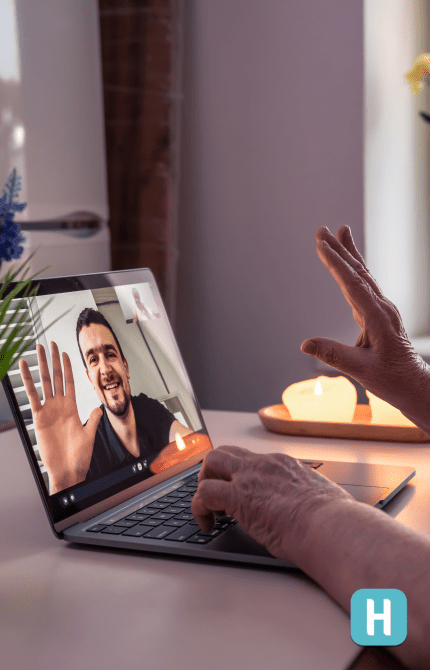
How Helply Makes Online Therapy Actually Work for Real People Like You
At Helply, we’ve seen firsthand that online therapy can be just as powerful, sometimes even more powerful, than in-person sessions.
But only when it’s done with care, intention, and the right support.
We don’t just give you a therapist. We give you:
A safe, non-judgmental space where you can show up messy, angry, tired, or unsure, and still be fully accepted.
Therapists who get it because they come from diverse, real-world backgrounds. You won’t have to explain your entire culture or story from scratch.
Support between sessions, with practical tools, check-ins, and a gentle nudge when you need it.
Flexibility that respects your life, not just your schedule. Late-night slots, weekend availability, and room to reschedule when life gets messy.
We believe in healing that feels human, not clinical online therapy work better.
What Helply Believes (And Why We Do This Work)
At Helply, we know that online therapy is more than just a trend.
For many people, it’s a lifeline. A bridge. A quiet space in the chaos of life.
But here’s what we really believe:
✅ You deserve a therapist who sees you, not just your symptoms.
✅ You deserve healing that fits into your life, not the other way around.
✅ You deserve a space that welcomes all parts of you, even the ones you hide.
Whether you’re new to therapy, starting again after a long break, or just looking for someone who finally gets it, we’re here for that.
With Helply, you’ll find:
- Therapists who listen without judgment.
- Sessions that adapt to your reality.
- Tools that support you in between sessions.
- A platform that’s built around your healing, not just convenience.
- We don’t expect you to have it all figured out.
- We just ask that you show up.
- We’ll meet you exactly where you are.
👉 Ready to take the next step? Start with Helply today.
FAQs
Q1. I feel awkward in online therapy. Is that normal?
Yes, totally normal. Most people feel a little weird at first. You’re opening up through a screen, maybe from your bedroom or car, of course, it’s going to feel different. But awkward doesn’t mean it’s not working. Give it a few sessions. The connection builds with time.
Q2. What if I don’t know what to say in a session?
That’s more common than you think. You don’t need to come in with a list. Sometimes the best sessions start with: “I’m not sure what to talk about today.” Your therapist is there to help guide the conversation, even on the days you feel blank.
Q3. Can I switch therapists if I’m not feeling a connection?
Yes, and you should. If something feels off, you’re not opening up, you don’t feel seen, or you’re just not clicking, it’s okay to explore other options. Therapy is personal. The right fit matters. A therapist you feel safe with makes a huge difference.
Q4. Is it okay if I cry or get emotional during a session?
Absolutely. There’s no such thing as being “too emotional” in therapy. Crying, laughing, being silent, venting, it’s all allowed. You don’t have to hold it together. This is your space to feel without judgment.
Q5. What if I don’t feel like I’m making progress?
Therapy progress isn’t always obvious. Sometimes it’s slow. Sometimes it shows up as tiny changes, setting a boundary, saying how you really feel, reacting differently. If you’re unsure, talk to your therapist about it. Progress looks different for everyone.
Q6. Can I do anything outside sessions to make online therapy work better?
Yes! Journaling, sitting with your thoughts after a session, practicing what you’ve discussed, or even taking a few quiet minutes before logging in can really help. Therapy isn’t just the session , it’s also what you do with it in your real life.
